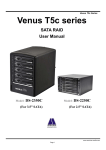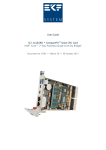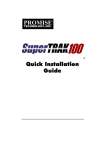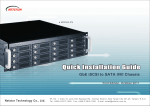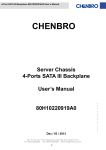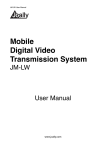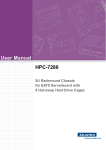Download DS-2250J User Manual
Transcript
Model: DS-2250J Venus T5 mini 2.5” SATA RAID User Manual www.amselectronics.com 1 Model: DS-2250J Contents 1. Features ….......................................................................................................................3 2. DIP Switch and RAID Mode cross reference.................................................................5 2.1 RAID 0 for High Performance..........................................................................................7 2.2 RAID 1 (Mirror) for High Security....................................................................................7 2.3 Stripe + Mirror (RAID 10) for High Performance and High Security............................7 2.4 Clone.................................................................................................................................8 2.5 JBOD (Concatenating).....................................................................................................8 2.6 Parity Protection...............................................................................................................9 2.7 Normal Mode (Single).......................................................................................................9 2 Model: DS-2250J 1. Features z z z z z z z z z All Aluminum design Plug & play, hot swappable Support Windows, Mac & Linux Built-in DIP Switch RAID mode setting LED indicators (for AC Power, HDD Error, HDD Access) Double Security handle lock Port Multiplier -- support up to 5 x 2.5” SATA HDD Built-in JMB393 Hardware RAID controller Transfer rate: SATA 1.5Gb/s、SATA 3Gb/s z z z 5 X 5 cm FAN X1— super air ventilation Buzzer Alarm for overheating Color: Black z z z 20W, AC 100~240V, 50/60Hz Dim: 5.5(L) X 3.1(W) X 4.9(H) inches Weight: 1.35 lbs (enclosure only) Figure 1 Figure 2 3 Model: DS-2250J --- Front Panel--- (See Figure 3) Front Panel Description: A1 ~ A5 :Front panel “Push-Open” Button a) Function: Push forward to open the front HDD front panel. b) LED Indication: See LED Status description on page 5 & 6. A 6: Power/System LED Power on Æ Solid blue Power off Æ No indication A7: Mechanical lock : To Open or Lock the front panels. Note: When push It to “un-lock” position, you can open the front panels by pressing the “push-Open button. While it is in the “lock” position, the 5 front panels are locked and cannot be open when you press the “push-open” button. Note: Do not try to press down the “push-open button while it is locked. Any inappropriate use of it may cause the damage of the mechanical lock. A8: Front Panel 4 Model: DS-2250J --Rear View--- (see Figure 4) Rear Parts Description: B1: Power Input (+5V B2: E-SATA port B3: Raid Setting DIP Switch 4A ) (*7 Raid Mode: Raid 0, 10, 3, 5, JBOD, Single, Clone) B4: Reset Device / Change Mode Button 1. Reset Device: Press it less than 2 seconds 2. Change Mode: Press it over 2 seconds B5: Buzzer Disable Button / Power Switch Button 1. Buzzer disable : Press it less than 2 seconds 2. Power Switch : Press it over than 2 seconds B6:Air ventilation holes Figure 4 ---LED Status--LED indicator(HDD0-HDD4) [see figure 3, A1~A5] Action Light On Message Hard Drive Installed color Blue Light Off Hard Drive uninstalled No Light On Hard Drive Fail Red Flash Hard Drive Access Blue Power / System LED Indicator [see figure 3, A6] Light On Power starting Blue Light On System is ready Purple Light Off Power is OFF No 5 Model: DS-2250J Raid Status RAID10 RAID3 RAID5 JBOD (Large) Clone RAID 0(Single) LED Indicator [see figure 3, A1~A5] Access Blue/Flash rebuilding Blue & Red/Flash Access Blue/Flash rebuilding Blue & Red /Flash Access Blue/Flash rebuilding Blue & Red /Flash Access Blue/Flash Access Blue/Flash Clone Blue & Red /Flash Access Blue/Flash 2. DIP Switch and RAID Mode cross reference User can configure any RAID mode as below by DIP switch setting and apply the change by pressing the Change-Mode-Switch. Note: When DIP Switch is set to RAID 10 ---*If you installed two HDD only, it is with RAID 1 mode *If you installed four HDD, then, it is RAID 10 mode 2.1 RAID 0 for High Performance RAID 0(or Stripe) is the segmentation of logically sequential data, such as a single file, so that 6 Model: DS-2250J segments can be assigned to multiple hard disks in a round-robin fashion and thus written concurrently. (If any one hard disk gets defective, information stored in this RAID 0 mode will be invalid.) 2.2 RAID 1 (Mirror) for High Security RAID 1 (or Mirror) is the replication of data onto separate hard disks in real time to ensure continuous availability. Take a RAID 1 system with two hard disks as an example, data in a hard disk will be exactly the same as the data in another hard disk. (Failure in a hard disk, Host controller still could read/write data. Users have to replace the defective hard disk. The device enclosure will enter identical-rebuild mode automatically) 2.3 Stripe + Mirror (RAID 10) for High Performance and High Security The Raid Enclosure could be configured to support Stripe and Mirror at the same time, i.e. RAID 10. Take four hard drives RAID 10 as an example, hard drive 0 and hard drive 1 could act as Mirror 1 and hard drive 2 and hard drive 3 could act as Mirror 1 too. Then, the Raid Enclosure configures these two Mirrors as Stripe. 7 Model: DS-2250J 2.4 Clone This mode is useful especially when users would like to copy data from a hard drive to several hard drives at the same time. Clone’s action is similar to RAID 1. However, all of the hard disks will be the mirrors. For example, in a four hard drives Clone environment, data in each hard drive will be the same. 2.5 JBOD (Concatenating) This mode is also named Concatenating. In this mode, the Raid Enclosure will concatenate all of the hard drives into a single hard drive with larger capacity. For example, if three 1TB hard disks are connected to the Raid Enclosure in concatenating mode, user will get a single hard disk with capacity of 3TB capacity. 2.6 Parity Protection 8 Model: DS-2250J XOR engine in the Raid Enclosure generates parity block. In RAID 3 mode, Parity Block will be stored in the same hard drive. While in RAID 5 mode, Parity Block will be spread over all of the different hard drives. The Raid Enclosure will also make use of same size disk space in each hard disk under RAID 3(or RAID 5) condition. (In RAID 3 or 5 modes, failure in a hard disk will cause the RAID Enclosure to enter degraded-mode. Host controller still could read/write data through the Raid Enclosure normally without knowing any defects. Users have to replace the defective hard disk. The Raid Enclosure then will enter identical-rebuild mode automatically.) 2.7 Normal Mode (Single) Normal mode means all of the configured hard drives exist and the Raid Enclosure is not in rebuild condition. Users can see the original hard drives from the host which supports port multiplier technology. (Note: If the host controller does not support Port Multiplier function, only one hard drive on the operating system will be detected. The RAID tool is useful in this case.) 9









